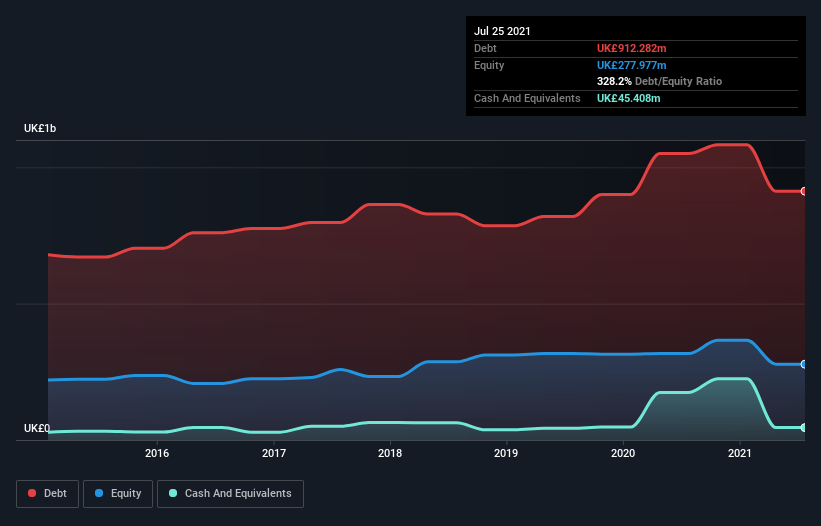- United Kingdom
- /
- Hospitality
- /
- LSE:JDW
J D Wetherspoon (LON:JDW) Has Debt But No Earnings; Should You Worry?
Warren Buffett famously said, 'Volatility is far from synonymous with risk.' So it seems the smart money knows that debt - which is usually involved in bankruptcies - is a very important factor, when you assess how risky a company is. We can see that J D Wetherspoon plc (LON:JDW) does use debt in its business. But the more important question is: how much risk is that debt creating?
What Risk Does Debt Bring?
Debt is a tool to help businesses grow, but if a business is incapable of paying off its lenders, then it exists at their mercy. In the worst case scenario, a company can go bankrupt if it cannot pay its creditors. While that is not too common, we often do see indebted companies permanently diluting shareholders because lenders force them to raise capital at a distressed price. By replacing dilution, though, debt can be an extremely good tool for businesses that need capital to invest in growth at high rates of return. The first step when considering a company's debt levels is to consider its cash and debt together.
Check out our latest analysis for J D Wetherspoon
How Much Debt Does J D Wetherspoon Carry?
As you can see below, J D Wetherspoon had UK£912.3m of debt at July 2021, down from UK£1.05b a year prior. However, it also had UK£45.4m in cash, and so its net debt is UK£866.9m.

How Strong Is J D Wetherspoon's Balance Sheet?
The latest balance sheet data shows that J D Wetherspoon had liabilities of UK£335.6m due within a year, and liabilities of UK£1.40b falling due after that. On the other hand, it had cash of UK£45.4m and UK£4.69m worth of receivables due within a year. So it has liabilities totalling UK£1.68b more than its cash and near-term receivables, combined.
This deficit casts a shadow over the UK£1.10b company, like a colossus towering over mere mortals. So we definitely think shareholders need to watch this one closely. After all, J D Wetherspoon would likely require a major re-capitalisation if it had to pay its creditors today. The balance sheet is clearly the area to focus on when you are analysing debt. But ultimately the future profitability of the business will decide if J D Wetherspoon can strengthen its balance sheet over time. So if you're focused on the future you can check out this free report showing analyst profit forecasts.
In the last year J D Wetherspoon had a loss before interest and tax, and actually shrunk its revenue by 39%, to UK£773m. To be frank that doesn't bode well.
Caveat Emptor
While J D Wetherspoon's falling revenue is about as heartwarming as a wet blanket, arguably its earnings before interest and tax (EBIT) loss is even less appealing. Indeed, it lost UK£100m at the EBIT level. When we look at that alongside the significant liabilities, we're not particularly confident about the company. We'd want to see some strong near-term improvements before getting too interested in the stock. Not least because it burned through UK£74m in negative free cash flow over the last year. That means it's on the risky side of things. There's no doubt that we learn most about debt from the balance sheet. However, not all investment risk resides within the balance sheet - far from it. For instance, we've identified 1 warning sign for J D Wetherspoon that you should be aware of.
If, after all that, you're more interested in a fast growing company with a rock-solid balance sheet, then check out our list of net cash growth stocks without delay.
New: Manage All Your Stock Portfolios in One Place
We've created the ultimate portfolio companion for stock investors, and it's free.
• Connect an unlimited number of Portfolios and see your total in one currency
• Be alerted to new Warning Signs or Risks via email or mobile
• Track the Fair Value of your stocks
Have feedback on this article? Concerned about the content? Get in touch with us directly. Alternatively, email editorial-team (at) simplywallst.com.
This article by Simply Wall St is general in nature. We provide commentary based on historical data and analyst forecasts only using an unbiased methodology and our articles are not intended to be financial advice. It does not constitute a recommendation to buy or sell any stock, and does not take account of your objectives, or your financial situation. We aim to bring you long-term focused analysis driven by fundamental data. Note that our analysis may not factor in the latest price-sensitive company announcements or qualitative material. Simply Wall St has no position in any stocks mentioned.
About LSE:JDW
J D Wetherspoon
Owns and operates pubs and hotels in the United Kingdom and the Republic of Ireland.
Good value with proven track record.
Similar Companies
Market Insights
Community Narratives



